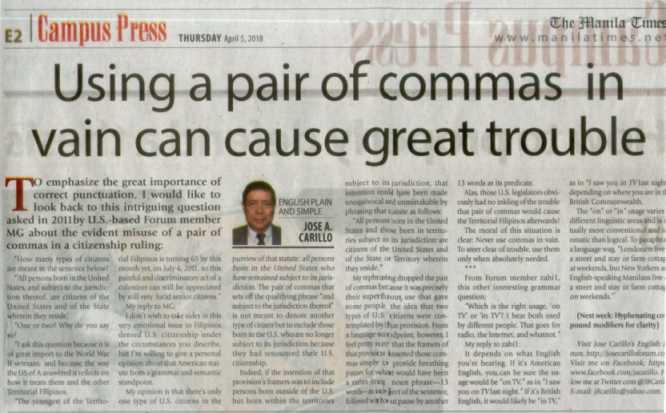To emphasize the great importance of correct punctuation, I would like to look back to this intriguing question asked in 2011 by U.S.-based Forum member MG about the evident misuse of a pair of commas in a citizenship ruling:
“How many types of citizens are meant in the sentence below?
“‘All persons born in the United States, and subject to the jurisdiction thereof, are citizens of the United States and of the State wherein they reside.’
“One or two? Why do you say so?
“I ask this question because it is of great import to the World War II veterans, and because the way the US of A answered it reflects on how it treats them and the other Territorial Filipinos.
“The youngest of the Territorial Filipinos is turning 65 by this month yet, on July 4, 2011, so this painful and discriminatory act of a colonizer can still be appreciated by still very lucid senior citizens.”
My reply to MG:I don’t wish to take sides in this very emotional issue to Filipinos denied U.S. citizenship under the circumstances you describe, but I’m willing to give a personal opinion about that American statute from a grammar and semantic standpoint.
IT TAKES SOME DOING TO AVOID USING A PAIR
OF NEEDLESS COMMAS IN SOME CONSTRUCTIONS
My opinion is that there’s only one type of U.S. citizens in the purview of that statute:
all persons born in the United States who have remained subject to its jurisdiction. The pair of commas that sets off the qualifying phrase “and subject to the jurisdiction thereof” is not meant to denote another type of citizen but to exclude those born in the U.S. who are no longer subject to its jurisdiction because they had renounced their U.S. citizenship.
Indeed, if the intention of that provision’s framers was to include persons born outside of the U.S. but born within the territories subject to its jurisdiction, that intention could have been made unequivocal and unmistakable by phrasing that statute as follows:
“All persons born in the United States and those born in territories subject to its jurisdiction are citizens of the United States and of the State or Territory wherein they reside.”
My rephrasing dropped the pair of commas because it was precisely their superfluous use that gave some people the idea that two types of U.S. citizens were contemplated by that provision. From a language standpoint, however, I feel pretty sure that the framers of that provision inserted those commas simply to provide breathing pauses for what would have been a rather long noun phrase—13 words—as subject of the sentence, followed without pause by another 13 words as its predicate.
Alas, those U.S. legislators obviously had no inkling of the trouble that pair of commas would cause the Territorial Filipinos afterwards!
The moral of this situation is clear: Never use commas in vain. To steer clear of trouble, use them only when absolutely needed.
***
From Forum member zabi1, this other interesting grammar question:
“Which is the right usage, ‘on TV’ or ‘in TV’? I hear both used by different people. That goes for radio, the Internet, and whatnot.”
My reply to zabi1:It depends on what English you’re hearing. If it’s American English, you can be sure the usage would be “on TV,” as in “I saw you
on TV last night.” If it’s British English, it would likely be “in TV,” as in “I saw you
in TV last night,” depending on where you are in the British Commonwealth.
The “on” or “in” usage varies in different linguistic areas and is actually more conventional and idiomatic than logical. To paraphrase a language wag, “Londoners live
in a street and stay in farm cottages
at weekends, but New Yorkers and English-speaking Manilans live
on a street and stay
in farm cottages
on weekends.”
 This essay appeared in the column “English Plain and Simple” by Jose A. Carillo in the Campus Press section of the April 5, 2018 issue (print edition only) of
This essay appeared in the column “English Plain and Simple” by Jose A. Carillo in the Campus Press section of the April 5, 2018 issue (print edition only) of The Manila Times
, © 2018 by the Manila Times Publishing Corp. All rights reserved.(Next week:
Hyphenating compound modifiers for clarity)